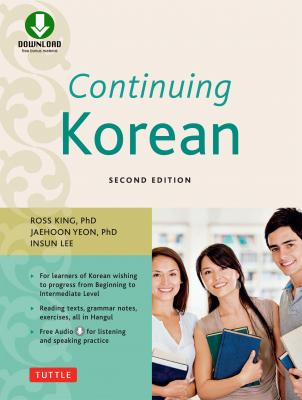Continuing Korean. Ross King
Читать онлайн.| Название | Continuing Korean |
|---|---|
| Автор произведения | Ross King |
| Жанр | Книги о Путешествиях |
| Серия | |
| Издательство | Книги о Путешествиях |
| Год выпуска | 0 |
| isbn | 9781462914920 |
Exercise 4: Fill in the Blank
In this exercise, fill in the blank with an appropriate -어서 form. E.g.: 늦어서 미안합니다, and then translate: Sorry I’m late. (Remember—어서 ~ -아서 is compatible only with plain bases!)
| 1. | 기분이 노래를 부릅니다. |
| 2. | 시간이 택시를 탔습니다. |
| 3. | 책을 많이 눈이 아픕니다. |
| 4. | 오래간만에 친구를 기분이 좋습니다. |
| 5. | 공부를 많이 피곤합니다. |
| 6. | 술을 많이 배가 아픕니다. |
| 7. | 하루 종일 피곤합니다. |
| 8. | 비가 야구를 못 했습니다. |
| 9. | 미안합니다. |
| 10. | 기분이 좋습니다. |
| 11. | 반갑습니다. |
| 12. | 점심을 못 배가 고파요. |
| 13. | 영화가 너무 ,끝까지 못 봤어요. |
| 14. | 사과는 이것만 있으니깐, 먹읍시다. |
Exercise 5: Using Infinitive + 서
Each of the following items contains two sentences. Connect them into a single sentence by using -서, and then translate. (Remember— -어서 ~ -아서 is not compatible with past or future bases!) For example, the first will be: 편지를 써서 우체국에 갔습니다. I wrote a letter and then went to the post office.
| 1. | 편지를 썼습니다. 우체국에 갔습니다. |
| 2. | 집을 팔았습니다. 미국에 갔습니다. |
| 3. | 도서관에 가겠습니다. 친구를 찾겠습니다. |
| 4. | 들어가세요. 선생님께 여쭤 보세요. |
| 5. | 나오세요. 잠깐 기다리세요. |
| 6. | 공원에 가시지요. 운동을 하시지요. |
| 7. | 밖에 나가세요. 담배를 피우세요. |
| 8. | 일어나세요. 아침을 잡수세요. |
| 9. | 여기 앉으세요. 기다리세요. |
| 10. | 일어나세요. 노래를 부르세요. |
| 11. | 누우세요. 좀 쉬세요. |
| 12. | 선생님을 만나요. 말씀 드리지요. |
| 13. | 머리가 아파요. 죽겠어요. |
| 14. | 더워요. 죽겠어요. |
| 15. | 피곤해요. 죽겠어요. |
| 16. | 배가 고파요. 죽겠어요. |
| 17. | 어제 우리집 개가 죽었어요. 좀 슬프지요. |
Exercise 6: Using -거든요
Each of the following items contains two sentences. Change the verb in the second sentence to the -거든요 ending, and then translate.
| 1. | 어제 하나도 못 잤어요. 언니하고 밤늦게까지 남자들에 대해서 이야기했어요. |
| 2. | 배가 고파서 죽겠어요. 점심을 못 먹고 왔어요. |
| 3. | 빨리 오세요. 준비가 다 됐어요. |
| 4. | 교수님은 지금 안 계십니다. 강의를 하러 들어가셨어요. |
| 5. | 요즘 너무 바빠서 죽겠어요. 지난주에 개학을 했어요. |
| 6. | 다음 주에 못 가겠어요. 우리 할아버님이 돌아가셨어요. |
| 7. | 손이 아파서 죽겠어요. 어제 다쳤어요. |
| 8. | 일요일은 안 되겠어요. 그날 친척이 와요. |
| 9. | 나는 바다에 가지 않고,산에 갈래요. 수영을 못 해요. |
| 10. | 손이 차갑지요? 밖이 추워요. |
| 11. | 걱정하지 마세요. 시간이 아직 있어요. |
| 12. | 거기 가지 마세요. 위험해요. |
| 13. | 기다리지 마세요. 아직 멀었어요. |
| 14. | 못 먹겠습니다. 방금 뭘 많이 먹고 왔어요. |
| 15. | 요즘 매일 수영을 해요. 수영장이 우리 집에서 가까워요. |
Exercise 7: English to Korean Translation
| Translate the following English sentences into Korean. | |
| 1. | Yesterday I went to the market and bought apples. |
| 2. | This morning I went to the department store and bought a present for my mother. |
| 3. | My father knows a lot about cars. |
| 4. | I’m glad my younger brother came yesterday. |
| 5. | Last Tuesday I went downtown and watched a movie. |
| 6. | Yesterday my friend came to our house and ate supper with us. |
| 7. | How about going to a coffee shop and having a cup of coffee? |
| 8. | I’m glad I drove for the first time in a long while. |
| 9. | Lately I’m learning a lot about Korean politics. |
| 10. | I feel good now that I’ve shaved. |
| 11. | My hand and arm hurt, so I won’t be able to play tennis with you. |
| 12. | I shaved and washed my face, so I feel refreshed now. |
| 13. | Let’s do the preparations first and then rest. |
| 14. | Our house is near [from] the bookstore. |
| 15. | A. I can’t solve this problem. |
| B. Then tell Professor Kim. | |
| 16. | Let’s ask the teacher about the exam. |
| 17. | I’ll go home quickly now and prepare our meal [Immediate Future]. |
| 18. | That professor lectures very well, so many people come. |
| 19. | Don’t get off here—change at the next station instead. |
| Lesson 17 |
육개장이랑 김치도 잡숴 보셨어요?
In this lesson we see Eunice Murphy and Miss Lee discussing Korean foods
